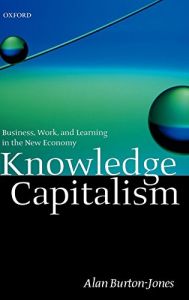Join getAbstract to access the summary!

Join getAbstract to access the summary!
Alan Burton Jones
Knowledge Capitalism
Business, Work, and Learning in the New Economy
Oxford UP, 1999
What's inside?
Get your company ready to trade in the currency of the future: Knowledge.
Recommendation
This book falls squarely into the apocalyptic tradition of business literature. It preaches the end of the world, and exhorts readers to repent and prepare for a new world unlike anything they have known. Burton-Jones has absorbed, organized and presented a mass of data to support his message. The data themselves are worth the price of the book, because they provide ample raw material from which to draw one’s own conclusions about the validity of the author’s thesis. He has trademarked certain key phrases in the book, and the frequent appearance of the superscript “TM” is a helpful reminder to the reader to remember that this book is at least in part a sales pitch for a consultancy practice. But it is nonetheless important to read this book because while Burton-Jones may be wrong about some things, he is clearly right that a big global economic change is underway, and he sets forth in clear, if colorless, prose a reasonably plausible explanation of what it is and why it is happening. getAbstract recommends the book to owners, managers, individuals, students, teachers, and policy-makers.
Summary
About the Author
Alan Burton-Jones, formerly Business Development Director of British Oxygen’s London-based computer services subsidiary, now heads an international IT and management consultancy practice headquartered in Australia and frequently speaks at business and technical conferences.

















Comment on this summary